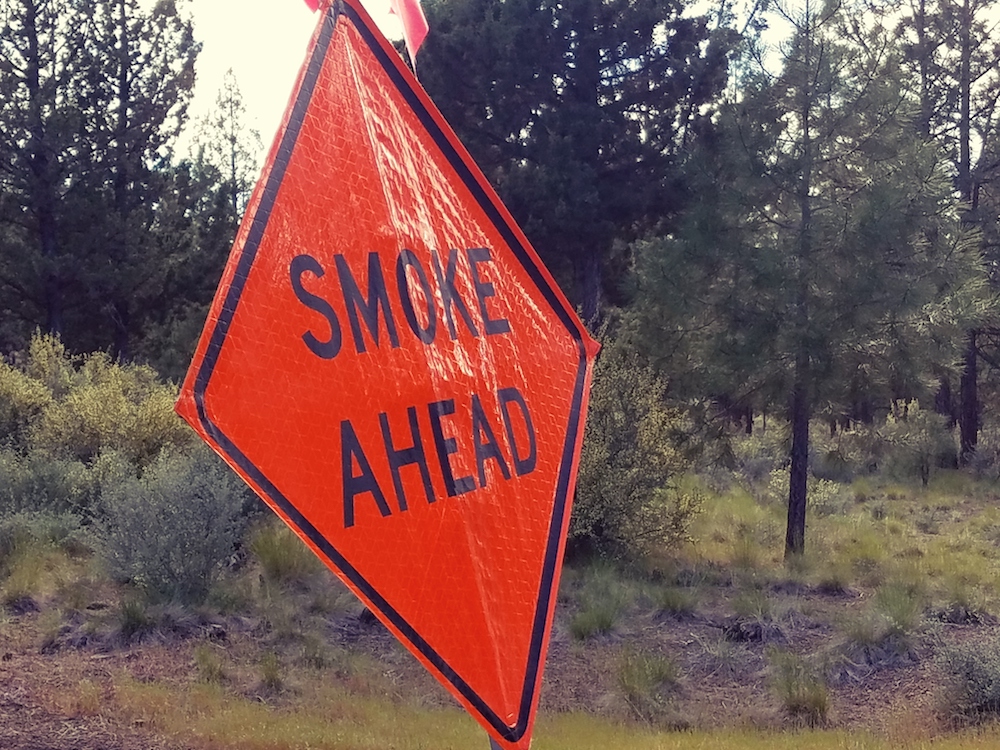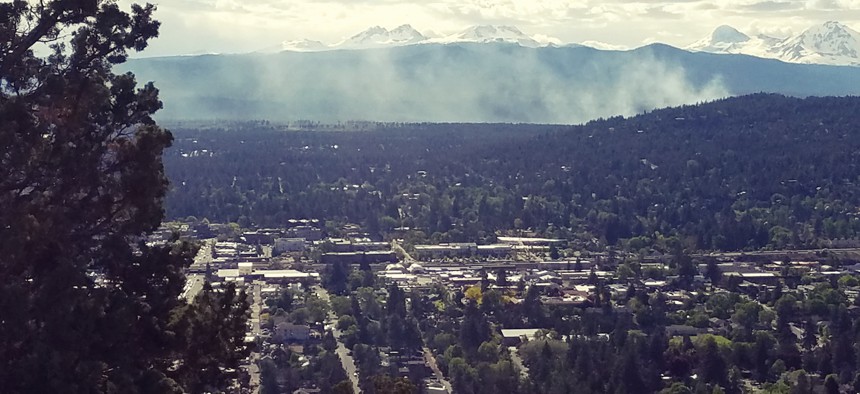Connecting state and local government leaders
In central Oregon, the city of Bend and Deschutes County are no strangers to big wildfires. But building more fire-resilient communities isn’t always easy.
“The Geography of Disaster Risk and Resiliency in America” is an ongoing series of Route Fifty dispatches that's part of an ebook released earlier this summer that provides snapshots of the very real dangers and disruptions that emergency planners, first responders, public officials and other stakeholders face, plus the strategies and technologies helping our communities be more resilient. | Previously: Madras, Oregon
BEND, Ore. — On a warm, weekday afternoon in May while looking out from the top of Pilot Butte State Scenic Overlook toward downtown and the mountains beyond, some hazy smoke could be seen rising west of the city in the foothills.
In a dry environment like central Oregon and so many other places across the West, smoke is usually a sign of trouble. But this was a controlled burn in Bend’s Shevlin Park, and one being managed by U.S. Forest Service personnel. On a road leading west out of Bend toward the park entrance, there were electronic message signs communicating to passersby that all was well and not to call 9-1-1.
Controlled burns are an important part of maintaining healthy forests and can help clear out dry overgrowth that can, under the right conditions, explode into a major wildland fire that’s difficult to bring under control or can threaten entire communities.
Deschutes County, which includes Bend, has plenty of experience dealing with destructive wildfires, including the massive August 2003 B&B Complex fires, which would end up burning through more than 90,000 acres of forestland northwest of the city.
But smaller blazes can be destructive, too. In 1990, the 3,000-acre Awbrey Hall Fire destroyed 22 homes on the western fringe of the city. Back then, Bend had about 25,000 residents.
Since then, Bend’s city limits have extended west a bit more and the population has grown to around 90,000 residents.
More of the city is in the “wildland-urban interface,” a term forest managers use to describe urbanized areas that sit on the margins of areas vulnerable to wildfires.
In 2014, the 6,900-acre Two Bulls Fire burned through land relatively close to the city, too, resurrecting fears of a repeat of the 1990 fire. Fortunately, no structures were lost, but if circumstances were different, the story could be tragic.
The very real risks of building in the wildland-urban interface are self-evident, especially as forests across the West continue to be ravaged by the ongoing bark-beetle infestation and drought conditions. Dead and diseased trees are fuel for potentially monstrous fires.

Forest management—and by extension, the emergency managers who have to deal with wildfires—sits uncomfortably at the intersection of policy discussions involving environmental conservation, land use and property rights.
Depending on where you are, forest management can be a volatile topic. Those tensions were somewhat on display during the National Association of Counties Western Interstate Region conference in May, which took place at the woodsy Sunriver Resort outside Bend.
“We’re looking at developing our communities in a very different way than we did 10 years ago, or even five years ago,” Romy Mortensen, the vice president of sales and marketing of Brooks Resources, a development company with long roots in Bend and central Oregon.
Mortensen gave a presentation about a housing development the company built on a former Christmas tree farm deeper into the wildland-urban interface west of Bend. The luxury homesites, in consultation with local officials, were developed with wildfire resiliency in mind.
That means, for instance, building homes that have enough of a buffer standing between them and flammable vegetation, or on a larger piece of acreage like The Tree Farm development, leaving enough undeveloped open space, allowing potential fires to burn—hopefully—past structures instead of through them. Clustering homes is part of the strategy, too, along with avoiding long “out and back” roads, which can trap residents if flames cut off the only escape route to safety.
“It’s the smart way to do it,” Mortensen said, noting that the community engagement process has turned prescribed burns into community events and educational opportunities.
But there was some grumbling coming from the audience of county officials who gathered for the conference session.
“What about property rights?” a county commissioner from eastern Washington state, wearing a cowboy hat, said to his colleagues sitting nearby, expressing skepticism.
Land-use planning rules, depending on which state or locality you’re in, can vary considerably across the West. In Oregon, the situation is more regulated, meaning that private property rights fall under the context of the state’s larger land-use plan.
That regulatory context led to the negotiations between the developer and local planners that led to The Tree Farm’s site final design. And the process used to plan the development is something the county wants to replicate and adapt for future residential developments in fire-vulnerable areas.
“In The Tree Farm, we have a much better development than what we would have had,” Anthony Raguine, a senior planner for Deschutes County, said during the conference.
Still, fire-adaptive planning practices do not necessarily lead to 100 percent fire-resistant communities.
Some of the skeptical county commissioners in the audience said that some of the giant wildfires their jurisdictions have had to deal with would have simply consumed everything on The Tree Farm development if it was built in their area, no matter how much of a fire-adaptive design was used.
The larger problems with fire management, some said, was that there isn’t enough logging to remove potential fuel and burdensome regulations that led to unhealthy forests ready to burn and burn big.
The only true way to prevent wildfires from destroying homes and threatening communities is not build in vulnerable forests in the first place. But that’s a tough sell for local officials across the West.
Michael Grass is Executive Editor of Government Executive’s Route Fifty and is based in Seattle.

NEXT STORY: 4 big opportunities for state-level innovation




